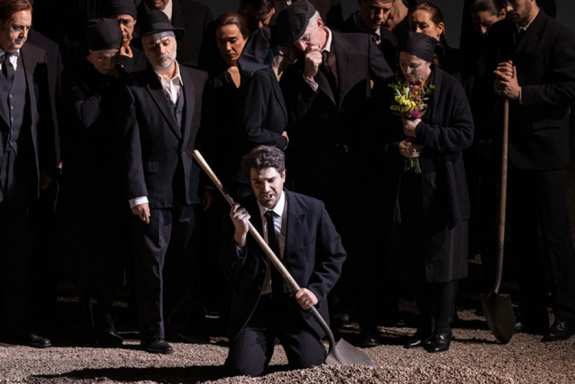 Spain Gluck, Orfeo ed Euridice: Generalitat Valenciana Chorus, Comunitat Valenciana Orchestra / Gianluca Capuano (conductor). Palau de Les Arts, Valencia, 5.3.2024. (JMI)
Spain Gluck, Orfeo ed Euridice: Generalitat Valenciana Chorus, Comunitat Valenciana Orchestra / Gianluca Capuano (conductor). Palau de Les Arts, Valencia, 5.3.2024. (JMI)

Production:
Stage director – Robert Carsen
Sets and Costumes – Tobias Hoheisel
Lighting designer – Robert Carsen, Peter van Praet
Chorus director – Francesc Perales
Cast:
Orfeo – Carlo Vistoli
Euridice – Francesca Aspromonte
Amore – Elena Galitskaya
This Gluck opera, based on the myth of Orpheus, is possibly the best in musical terms of all the Orpheus operas. It is the first time that it has been performed at the Palau de Les Arts, and the result was definitely positive, especially the staging by Robert Carsen.
The Carsen staging was premiered by Canadian Opera in Toronto in 2011 – a co-production with Paris’s Théâtre des Champs-Elysées, Teatro dell’Opera di Roma and Opera Royal de Versailles – is one of the most important in recent years. There is an empty stage, representing a desolate landscape, where Euridice’s burial takes place. In the scene of the Furies in Hell, the stage is occupied by a series of choristers whom Orpheus addresses as he searches for his beloved wife. Finally, we return to the empty stage of the first act.
The action has been moved to modern times which seems perfectly acceptable since Orpheus is no more than a myth and myths are timeless. The costumes are always in black for both chorus and soloists. The wonderful lighting stands out here, and the stage direction is very good: the chorus moves well, which is important in this opera.
The musical direction was under Gianluca Capuano, a specialist in Baroque music and a regular accompanist of Cecilia Bartoli. His reading was a bit disappointing in the sense that I expected more from him – the music lacked emotion and nuances and became a bit monotonous. I prefer what René Jacobs offered last year in Barcelona. Both the orchestra and the chorus gave solid performances.

Orfeo was sung by countertenor Carlo Vistoli, and we were notified of his indisposition at the beginning of the performance. I confess that I am not very fond of countertenor voices, and in this opera I always prefer Orfeo with to be sung by a contralto or tenor. Vistoli was fine in the role, although there were certain precautions on his part, which is not surprising given the initial announcement.
Soprano Francesca Aspromonte was Euridice, and her voice is attractive, she sings expressively and moves well on stage. Amore was soprano Elena Galitskaya, who did well in her attempts with Orfeo to bring the unfortunate Euridice back to life.
José M. Irurzun
